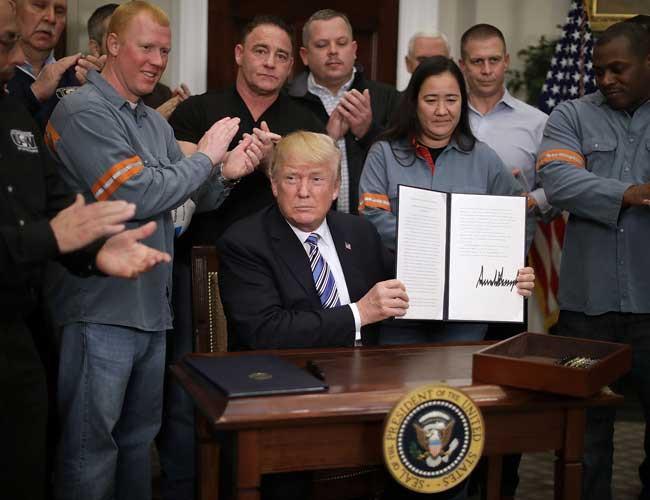
Turkey is among the countries and trade organizations to condemn U.S. President Donald Trump’s decision to slap punitive tariffs on foreign steel and aluminum, as fears grew of a global trade war, with announcing counter-measures.Some of the trade partners have asked for exemptions.
Trump pressed ahead on March 8 with import tariffs of 25 percent on steel and 10 percent for aluminum. However, he exempted Canada and Mexico and also offered the possibility of excluding other allies, backtracking from an earlier “no-exceptions” stance.
Describing the dumping of steel and aluminum in the U.S. market as “an assault on our country,” Trump said in a White House announcement that the best outcome would for companies to move their mills and smelters to the United States.
He insisted that domestic metals production was vital to national security.
Signals of countermeasures or exemption requests followed his move.
In an interview with Nikkei in an earlier date this week, Turkish Economy Minister Nihat Zeybekci discussed Ankara’s response to planned U.S. tariffs on steel and aluminum.
Turkey accounts for 5.7 percent of American steel imports, a larger share than Japan.
“We will take countermeasures,” though not in the form of retaliatory duties, Zeybekci asserted.
Instead, he hinted at such steps as more stringent customs inspections, saying Turkish importers will be “more sensitive” regarding American products.
Zeybekci warned that there is “a danger of a trade war,” citing statements from Japan, China, the EU and Canada.
Turkey and the European Union decided to move together at the World Trade Organization (WTO) platform against the United States’ planned tariffs on steel and aluminum imports, the Turkish Economy Ministry announced on March 6.
In a written statement on March 6, the ministry said Zeybekci spoke to European Union Trade Commissioner Cecilia Malmström on the phone regarding the issue and they agreed to move together at the WTO platform.
‘Fears of tit-for-tat escalation’
International Monetary Fund Managing Director Christine Lagarde said on March 8 that she feared a “tit-for-tat” escalation of trade retaliation over U.S. President Donald Trump’s steel and aluminum tariffs that would sap business confidence and investment.
Lagarde, speaking at a Washington Post forum on women’s issues, said it was not the direct economic impact from the tariffs that concerned her most, but its role as a “trigger” for retaliatory responses from trading partners worldwide.
“It is that escalation that is in and of itself dangerous for the impact that it has on all those economies, and furthermore for the impact that it has on confidence,” Lagarde said, noting that trade has been an engine of growth that has fueled a stronger global recovery in recent months.
“And confidence is a super-precious good that builds over time and can be destroyed very quickly,” Lagarde said. “If the perception of investors around the world is that this is uncertain, and you never know where the tariffs are going to go, how high, how low, against whom ... then you step back and you don’t invest, you wait and that confidence impact could be significant.”
Merkel urges dialogue
Chancellor Angela Merkel of Germany, Europe’s biggest economy and NATO ally, urged dialogue and warned that “no one can win in such a race to the bottom.”
Berlin backs the European Union in “seeking dialogue with the United States, but also with countries that could be affected, like China,” she said.
Earlier, German Economy Minister Brigitte Zypries said: “This protectionism is an affront to close partners like the European Union and Germany and limits free trade.”
The EU has threatened retaliatory tariffs on items from steel to peanut butter, bourbon and denim -- most of which are produced in states that Trump needs to win to be re-elected.
“We are prepared and will be prepared if need be to use rebalancing measures,” European Commission Vice President Jyrki Katainen told reporters in Brussels.
The top EU trade official Cecilia Malmstroem said the entire bloc, as a “close ally” of the U.S., “should be excluded” from the tariffs, and vowed to “seek more clarity” from Washington.
Harsh reaction from Japan
Close U.S. ally Japan warned the tariffs of 25 percent on imported steel and 10 percent on aluminum “could have a grave impact on the economic relationship” between the world’s top and third-largest economies.
Japan’s top government spokesman Yoshihide Suga said the move could harm the global trading system and the entire world economy and said Tokyo would seek an exemption.
The world’s second-biggest economy, China, derided the tariffs as “a serious attack on normal international trade order.”
Amid the escalating row, European Central Bank chief Mario Draghi has voiced concern for the “state of international affairs.”
“If you put tariffs against what are your allies, one wonders who the enemies are,” said Draghi on March 8.
Brazil and Britain were also quick to launch broadsides against the tariffs, which are worth billions of dollars.
Major producer Brazil immediately vowed to take “all necessary steps” in order to “protect its rights and interests” in response to the U.S. move.
Britain blasted the tariffs as “not the right way” to tackle the problem of global overcapacity in steel.